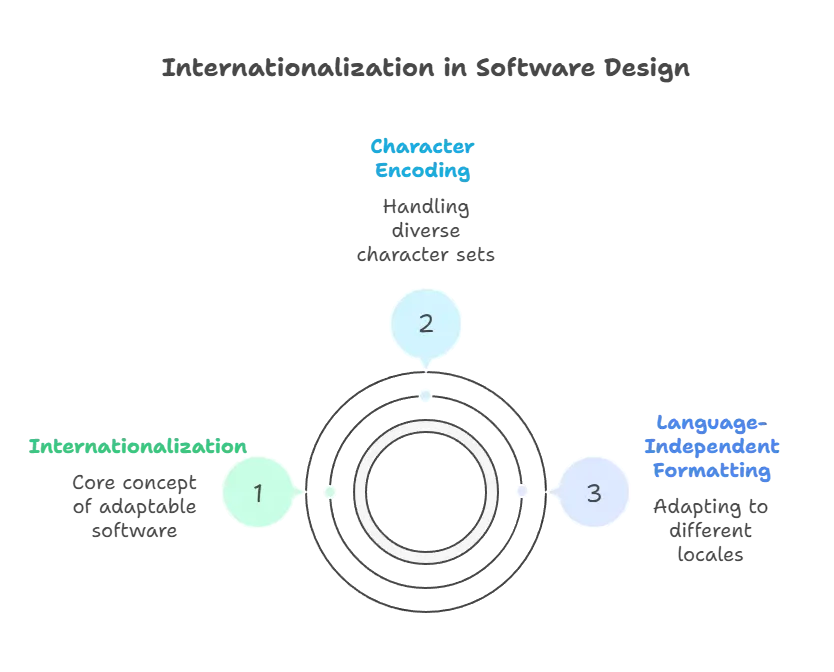Internalization and Localization
Internationalization and localization are important concepts in software development, especially when it comes to creating applications that can be used by people from diverse linguistic and cultural backgrounds. In this chapter, we'll explore what internationalization and localization mean in the context of C programming, and how they can be implemented effectively.
Internationalization, often abbreviated as I18N, is the process of designing software in a way that it can be easily adapted to different languages and regions without engineering changes. Let’s delve into the key aspects:
Character Encoding
Character encoding plays a crucial role in internationalization as different languages may use different character sets. In C programming, Unicode (UTF-8, UTF-16, UTF-32) is widely used for handling international characters.
#include <stdio.h>
int main() {
// Unicode string in C
wchar_t greeting[] = L"Hello, 你好, नमस्ते";
// Print the Unicode string
wprintf(L"%ls\n", greeting);
return 0;
}
// output //
Hello, 你好, नमस्ते
Language-Independent Formatting
Avoid hardcoding language-specific formatting elements like date, time, and currency. Instead, use standard libraries and functions that can adapt to different locales.
#include <stdio.h>
#include <time.h>
#include <locale.h>
int main() {
time_t rawtime;
struct tm * timeinfo;
time(&rawtime);
timeinfo = localtime(&rawtime);
setlocale(LC_TIME, "de_DE"); // Set locale to German
printf("German Date and Time: %s", asctime(timeinfo));
setlocale(LC_TIME, "fr_FR"); // Set locale to French
printf("French Date and Time: %s", asctime(timeinfo));
return 0;
}
// output //
German Date and Time: Mon Mar 25 21:20:12 2024
French Date and Time: lun. mars 25 21:20:12 2024

Implementing Localization (L10N)
Localization, often abbreviated as L10N, is the process of adapting software for a specific region or language by translating text and adjusting cultural elements. Let’s explore how we can achieve this in C
Message Catalogs
Message catalogs store translated strings for different languages. In C, these are typically implemented using the gettext library.
#include <stdio.h>
#include <locale.h>
#include <libintl.h>
#define _(String) gettext (String)
int main() {
setlocale(LC_ALL, "");
bindtextdomain("hello", "/usr/share/locale");
textdomain("hello");
printf(_("Hello, world!\n"));
return 0;
}
// output //
Bonjour, le monde!
Handling Plural Forms
Different languages have different rules for pluralization. It’s essential to handle plural forms dynamically.
#include <stdio.h>
#include <locale.h>
#include <libintl.h>
#define _(String) gettext (String)
#define N_(String) String
int main() {
setlocale(LC_ALL, "");
bindtextdomain("plural", "/usr/share/locale");
textdomain("plural");
int apples = 5;
printf(ngettext("%d apple", "%d apples", apples), apples);
return 0;
}
// output //
5 Äpfel
In conclusion, internationalization and localization are essential for creating software that can be used by people worldwide. By following best practices and utilizing appropriate libraries and techniques, developers can ensure their C programs are accessible and user-friendly across different languages and cultures. Remember to consider aspects like character encoding, language-independent formatting, message catalogs, and handling plural forms to achieve effective internationalization and localization. With these strategies in place, you can make your C applications truly global. Happy coding!❤️
